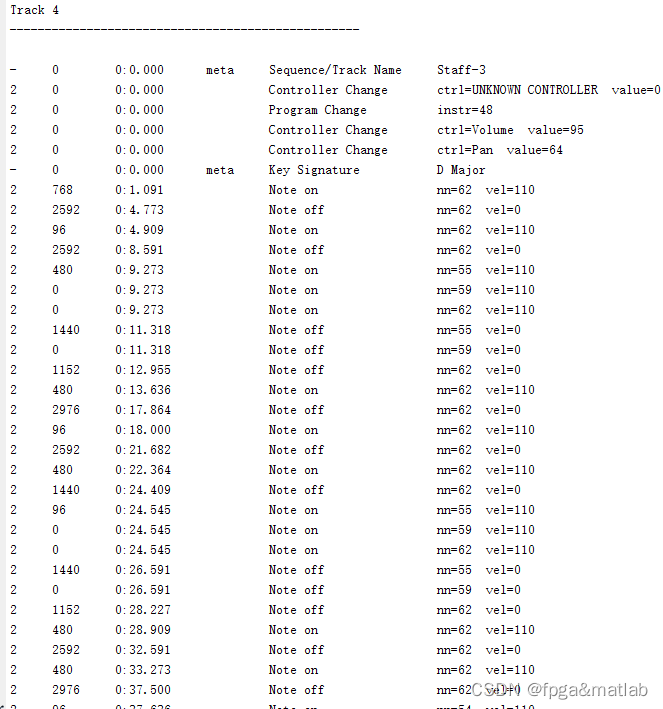【MID音频读取和分析】基于matlab的MID音频文件读取和分析
目录
1.软件版本
matlab2013b
2.理论知识
这个部分,不涉及什么原理,主要是对MIDI音频信号需要了解其主要的文件结构特点,MIDI文件的主要结构如下:
http://wenku.baidu.com/view/298f6f758e9951e79b8927fa.html
3.核心代码
function midi = readmidi(filename, rawbytes)
if (nargin<2)
rawbytes=0;
end
fid = fopen(filename);
[A count] = fread(fid,'uint8');
fclose(fid);
if (rawbytes) midi.rawbytes_all = A; end
if ~isequal(A(1:4)',[77 84 104 100]) % double('MThd')
error('File does not begin with header ID (MThd)');
end
header_len = decode_int(A(5:8));
if (header_len == 6)
else
error('Header length != 6 bytes.');
end
format = decode_int(A(9:10));
if (format==0 || format==1 || format==2)
midi.format = format;
else
error('Format does not equal 0,1,or 2');
end
num_tracks = decode_int(A(11:12));
if (format==0 && num_tracks~=1)
error('File is format 0, but num_tracks != 1');
end
time_unit = decode_int(A(13:14));
if (bitand(time_unit,2^15)==0)
midi.ticks_per_quarter_note = time_unit;
else
error('Header: SMPTE time format found - not currently supported');
end
if (rawbytes)
midi.rawbytes_header = A(1:14);
end
ctr = 15;
for i=1:num_tracks
if ~isequal(A(ctr:ctr+3)',[77 84 114 107]) % double('MTrk')
error(['Track ' num2str(i) ' does not begin with track ID=MTrk']);
end
ctr = ctr+4;
track_len = decode_int(A(ctr:ctr+3));
ctr = ctr+4;
% have track.rawbytes hold initial 8B also...
track_rawbytes{i} = A((ctr-8):(ctr+track_len-1));
if (rawbytes)
midi.track(i).rawbytes_header = A(ctr-8:ctr-1);
end
ctr = ctr+track_len;
end
for i=1:num_tracks
track = track_rawbytes{i};
if (rawbytes); midi.track(i).rawbytes = track; end
msgCtr = 1;
ctr=9; % first 8B were MTrk and length
while (ctr < length(track_rawbytes{i}))
clear currMsg;
currMsg.used_running_mode = 0;
% note:
% .used_running_mode is necessary only to
% be able to reconstruct a file _exactly_ from
% the 'midi' structure. this is helpful for
% debugging since write(read(filename)) can be
% tested for exact replication...
%
ctr_start_msg = ctr;
[deltatime,ctr] = decode_var_length(track, ctr);
% ?
%if (rawbytes)
% currMsg.rawbytes_deltatime = track(ctr_start_msg:ctr-1);
%end
% deltaime must be 1-4 bytes long.
% could check here...
% CHECK FOR META EVENTS ------------------------
% 'FF'
if track(ctr)==255
type = track(ctr+1);
ctr = ctr+2;
% get variable length 'length' field
[len,ctr] = decode_var_length(track, ctr);
% note: some meta events have pre-determined lengths...
% we could try verifiying they are correct here.
thedata = track(ctr:ctr+len-1);
chan = [];
ctr = ctr + len;
midimeta = 0;
else
midimeta = 1;
% MIDI EVENT ---------------------------
% check for running mode:
if (track(ctr)<128)
% make it re-do last command:
%ctr = ctr - 1;
%track(ctr) = last_byte;
currMsg.used_running_mode = 1;
B = last_byte;
nB = track(ctr); % ?
else
B = track(ctr);
nB = track(ctr+1);
ctr = ctr + 1;
end
% nibbles:
%B = track(ctr);
%nB = track(ctr+1);
Hn = bitshift(B,-4);
Ln = bitand(B,15);
chan = [];
msg_type = midi_msg_type(B,nB);
% DEBUG:
if (i==2)
if (msgCtr==1)
disp(msg_type);
end
end
switch msg_type
case 'channel_mode'
% UNSURE: if all channel mode messages have 2 data byes (?)
type = bitshift(Hn,4) + (nB-120+1);
thedata = track(ctr:ctr+1);
chan = Ln;
ctr = ctr + 2;
% ---- channel voice messages:
case 'channel_voice'
type = bitshift(Hn,4);
len = channel_voice_msg_len(type); % var length data:
thedata = track(ctr:ctr+len-1);
chan = Ln;
% DEBUG:
if (i==2)
if (msgCtr==1)
disp([999 Hn type])
end
end
ctr = ctr + len;
case 'sysex'
% UNSURE: do sysex events (F0-F7) have
% variable length 'length' field?
[len,ctr] = decode_var_length(track, ctr);
type = B;
thedata = track(ctr:ctr+len-1);
chan = [];
ctr = ctr + len;
case 'sys_realtime'
% UNSURE: I think these are all just one byte
type = B;
thedata = [];
chan = [];
end
last_byte = Ln + bitshift(Hn,4);
end % end midi event 'if'
currMsg.deltatime = deltatime;
currMsg.midimeta = midimeta;
currMsg.type = type;
currMsg.data = thedata;
currMsg.chan = chan;
if (rawbytes)
currMsg.rawbytes = track(ctr_start_msg:ctr-1);
end
midi.track(i).messages(msgCtr) = currMsg;
msgCtr = msgCtr + 1;
end % end loop over rawbytes
end % end loop over tracks
function val=decode_int(A)
val = 0;
for i=1:length(A)
val = val + bitshift(A(length(A)-i+1), 8*(i-1));
end
function len=channel_voice_msg_len(type)
if (type==128); len=2;
elseif (type==144); len=2;
elseif (type==160); len=2;
elseif (type==176); len=2;
elseif (type==192); len=1;
elseif (type==208); len=1;
elseif (type==224); len=2;
else
disp(type); error('bad channel voice message type');
end
%
% decode variable length field (often deltatime)
%
% return value and new position of pointer into 'bytes'
%
function [val,ptr] = decode_var_length(bytes, ptr)
keepgoing=1;
binarystring = '';
while (keepgoing)
% check MSB:
% if MSB=1, then delta-time continues into next byte...
if(~bitand(bytes(ptr),128))
keepgoing=0;
end
% keep appending last 7 bits from each byte in the deltatime:
binbyte = ['00000000' dec2base(bytes(ptr),2)];
binarystring = [binarystring binbyte(end-6:end)];
ptr=ptr+1;
end
val = base2dec(binarystring,2);
%
% Read first 2 bytes of msg and
% determine the type
% (most require only 1st byte)
%
% str is one of:
% 'channel_mode'
% 'channel_voice'
% 'sysex'
% 'sys_realtime'
%
function str=midi_msg_type(B,nB)
Hn = bitshift(B,-4);
Ln = bitand(B,7);
% ---- channel mode messages:
%if (Hn==11 && nB>=120 && nB<=127)
if (Hn==11 && nB>=122 && nB<=127)
str = 'channel_mode';
% ---- channel voice messages:
elseif (Hn>=8 && Hn<=14)
str = 'channel_voice';
% ---- sysex events:
elseif (Hn==15 && Ln>=0 && Ln<=7)
str = 'sysex';
% system real-time messages
elseif (Hn==15 && Ln>=8 && Ln<=15)
% UNSURE: how can you tell between 0xFF system real-time
% message and 0xFF meta event?
% (now, it will always be processed by meta)
str = 'sys_realtime';
else
% don't think it can get here...
error('bad midi message');
end
4.操作步骤与仿真结论

A03-11






【推荐】国内首个AI IDE,深度理解中文开发场景,立即下载体验Trae
【推荐】编程新体验,更懂你的AI,立即体验豆包MarsCode编程助手
【推荐】抖音旗下AI助手豆包,你的智能百科全书,全免费不限次数
【推荐】轻量又高性能的 SSH 工具 IShell:AI 加持,快人一步
· Manus重磅发布:全球首款通用AI代理技术深度解析与实战指南
· 被坑几百块钱后,我竟然真的恢复了删除的微信聊天记录!
· 没有Manus邀请码?试试免邀请码的MGX或者开源的OpenManus吧
· 园子的第一款AI主题卫衣上架——"HELLO! HOW CAN I ASSIST YOU TODAY
· 【自荐】一款简洁、开源的在线白板工具 Drawnix